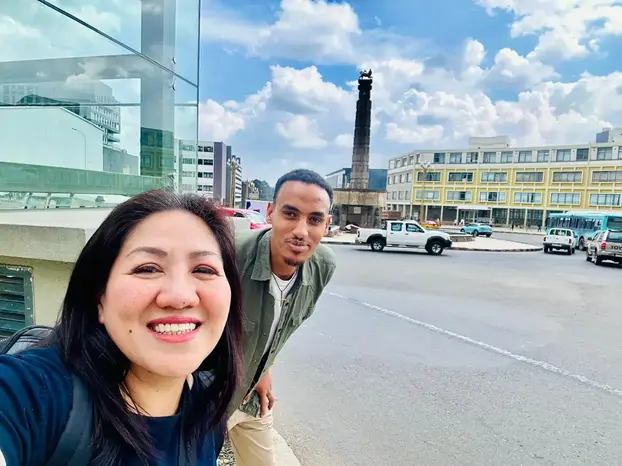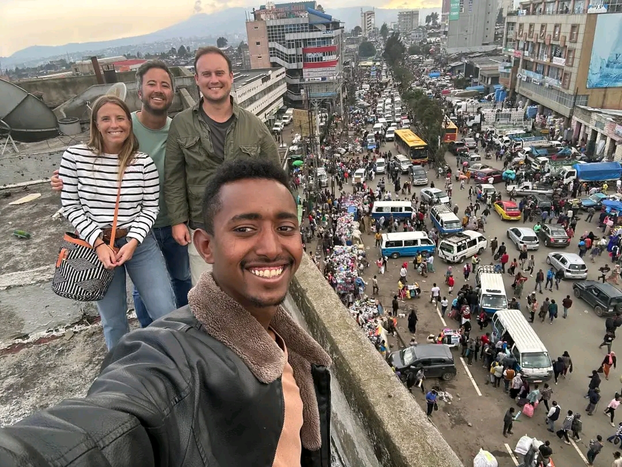Things to Do in Addis Ababa
FREE WALKING IN ADDIS ABABA ETHIOPIA.
Come join me as we explore the vibrant heart of Ethiopia during a captivating walking tour through Addis Ababa!
Let’s begin our journey at the majestic National Museum, home to the ancient fossilized remains of Lucy, our human ancestor. Wander through the bustling streets of the Mercato, Africa's largest open-air market, where vibrant colors, exotic spices, and traditional crafts await.
We can stroll along Churchill Avenue, lined with charming cafes and shops, as you make your way to Holy Trinity Cathedral, a stunning architectural masterpiece adorned with intricate carvings and beautiful stained glass windows. Delve into the city's rich history at the Ethnological Museum, housed in Emperor Haile Selassie's former palace, and discover artifacts showcasing Ethiopia's diverse cultural heritage.
Conclude your unforgettable journey with a taste of traditional Ethiopian cuisine at one of the city's renowned restaurants, where you can savor the flavors of injera, spicy stews, and aromatic coffee.
With its rich history, vibrant culture, and warm hospitality, Addis Ababa promises an enchanting experience at every turn.
NOTE TO TRAVELLERS
Additional cost for tour?
The tours do not have a set price, instead, each person have gives the tour at the end of the tour the amount that he or she considers appropriate.
These usually range from depending on satisfaction with the tour.
FREE CANCELLATION!
If you will not be able to attend the tour, please cancel your booking, otherwise the guide will be waiting for you.
Come join me to explore of ancient Ethiopia during a slower walking tour through Addis Ababa!
Wander the largest open Air market with busy streets of the MERKATO where vibrant colors, exotic spices, and traditional crafts await.
Ethiopia is home of Coffee"
Need some break now and let's Go to try ETHIOPIAN COFFEE
Coffee is an everyday commodity that people all over the world enjoy.
coffee is more than just a cup of joy,It is a significant part of Ethiopians’ lives a livelihood,
lets walk unforgettable journey to see the first rail way called Lagar connect From Addis Ababa to Dijibouti,made by the French and Ethiopian in 1917.
We will have a chance to see the Lion of Judah Monuments on the way.
Last thing to do during the night Yod Abissinia Night live dance of the Ethiopian Traditional live dance called Eskita and different nation dance.
You can attend from 7.30 pm to 9 pm and capture more picture during the party.
You can not do all at one day in a walking tour,but you can still choose the time and select specific place you don't want to miss.
With its rich history, vibrant culture, and warm hospitality, Addis Ababa promises an enchanting experience at every turn.
NOTE TO TRAVELLERS:
Addition info,WhatsApp +251980135358
Debrelibanos Monastry
Bisheftu lake
Adadi Maryam(Tiya)
Wonchi creater lake.
The tours do not have a set price, instead, each person have gives the tour at the end of the tour the amount that he or she considers appropriate.
These usually range from depending on satisfaction with the tour.
Last thing to Just let you know
Some museum and park have entrance from $8to $10
Let's walk around here to see the most historic and attractive place.
We'll begin our journey at the majestic National Museum, home to the ancient fossilized remains of Lucy , our human ancestor. Stroll through the bustling streets of the Mercato , Africa's largest open-air market , where vibrant colors, exotic spices and traditional crafts await you.
We can stroll along Churchill Avenue, lined with charming cafes and shops ,
Conclude your unforgettable trip with a taste of traditional Ethiopian cuisine at one of the city's renowned restaurants, where you can savour the flavours of injera, spicy stews and aromatic coffee.
With its rich history, vibrant culture and warm hospitality, Addis Ababa promises a delightful experience at every step.
NOTE TO TRAVELERS
Additional cost for the tour?
Payment sheger park 2 $
Chrch st george 4 $
FREE CANCELLATION!
If you are unable to attend the tour, please cancel your reservation, otherwise the guide will be waiting for you.
The Addis Ababa Mercato is the largest open-air market in all Africa. Within the labyrinthian alleyways it is possible to purchase anything you desire from cheap electronics to exotic fruits. Let the products be your landmark, for there is no map for getting around the miles wide trading centre. The only way to distinguish your location is to notice the product being sold. Spices, papayas, mangos, lemons, oranges, pomegranates and passion fruits, lamb, beef, carved crafts, jewellery and over one hundred coffee merchants, hawking their region’s variety, are crammed into the narrow streets of the Addis Ketema district.
Half a mile east of the present day Mercato is the Arada district, where the market used to be located. During the Italian occupation the traditional location in front of St. George’s Church was reserved strictly for Italians, driving the Amhara and Tigray further afield. The native Ethiopians joined the Arab trading centre in the Addis Ketema district, subsuming it completely by the 1960’s. Today, Arada’s streets are adorned with upmarket shops.
Being a reliable Guru of Addis is my the best feature. I will explain the whole history of Addis Ababa through these emblematic and famous places, how it was founded, curiosities, the history, and many other things. Moreover, we will go to hidden places only known by a local :). If you want to know everything about this fantastic city, you can’t miss my guruwalk in Addis Ababa! What are we going to visit: -Mesqel Square - UNECA and Africa Union -Merkato Market -Piassa (Old town) -University ( Ethnological Museum) - Shiromeda Cultural Cloth Market -Entoto Mountain -Local and Indigenous drinks and foods -Religious Heritage -National Museum -Arat Kilo and Kasanchis -Shola Market -This tour also takes to Debire Zeyit ( Bishoftu) Lakes Depending on the traveler time probably in next day of the tour. Most Unique things of Ethiopia 1. Calendar and Time The Ethiopian calendar is closely related to the Coptic and Julian calendars, but it is not quite the same. Ethiopia has 13 months. The 12 months have 30 days each and the 13 month has 5 days and 6 days once in four year that making Ethiopia 7 and half years behind the Gregorian calendar. Ethiopia celebrates its new year in every September first of Ethiopian calendar. Ethiopia is in the GMT + 3 hours’ time zone. The sun dictates the Ethiopian Time. When you get up early in the morning you start by counting one and you end up at twelve when the day ends, and start counting again from one when the night begins and end at twelve o’clock just before the sunrises in the morning. The Ethiopian midday and midnight is six o’clock. So be aware that the counting system of Ethiopian time and date is not the same as you some local people can understand your counting system too. 2. Amharic Alphabet Ethiopia has its own Alphabet and numeric. Amharic is the main language of Ethiopia. Amharic Alphabet has 35 main letters with having 6 each relatives. 3. Food Ethiopian Food is Diverse, Spicy and exotic. Injera is the stable or dominant food of Ethiopians which takes 3 days to bake. Injera is made from cereal grain known as Teff. Injera can be served with a rainbow of different foods such as meat, Vegetable, pulses and soon. Ingera can be eaten by hand rather not by folks and spoon. 4. Coffee The most coffee grown place in Ethiopia are Keffa in south, Jimma in south west, Welega in North West and Harar in the East. The preferable coffee to drink is from the boiled coffee pot than the machine coffee. The Ethiopian coffee ceremony is an important part of Ethiopian culture. It involves roasting coffee beans and preparing boiled coffee in a vessel akin to the ibriks. The coffee ceremony involves processing the raw, unwashed coffee beans into finished cups of coffee. 5. The Cradle of Human kind ( Hominid) and Never colonized 6. Music and Dancing ( Eskista) The music of Ethiopia is extremely diverse. It uses distinct modal system that is pentatonic, with characteristically long intervals between some notes. Even if you can’t understand the words, Ethiopian music is so expressive and soulful that you will enjoy it anyway! Traditional Ethiopian dance is unique. Mainly comprised of fast, rhythmic upper body movements, the dancing is not only beautiful, but tells a story of life, culture, and tradition in Ethiopia. There is some cultural restaurant that have the Ethiopian cultural live dance music along with the food in every evening.




















































